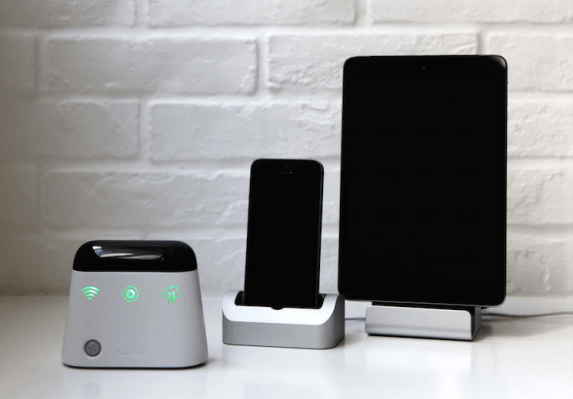Created by a Hong Kong startup, Ambi Climate is the latest entrant in the smart air conditioner market. The smartphone-controlled device is designed to work with split-unit air conditioners that have an infrared sensor and use machine learning to keep your home at a comfortable temperature while reducing energy consumption. Ambi Climate’s first target markets are in Asia, but it plans to roll out in other countries as well. It started raising funds on Crowdtivate, an Asia-focused crowdfunding site, today.
Ambi Climate is the first product from Ambi Labs, which was founded by Julian Lee, Paul Sykes, and Timothy Chang. Lee first became interested in adding a smartphone-controlled interface to his home air conditioner to keep his 12-year-old husky comfortable during the summer when Lee wasn’t at home.
The device uses machine learning to take in information about your home, temperature preferences, and local weather patterns. Over the past two years, Ambi Labs surveyed 4,000 consumers in 10 Asian countries (China, Japan, Korea, Indonesia, Australia, Taiwan, Thailand, Singapore, Malaysia, and Hong Kong). The startup found that many users keep their air conditioner unit set to the lowest temperature and then switch it off when it gets too cold.
“The resulting ‘yo-yoing’ in temperature, as some of our research participants called it, is both uncomfortable and a waste of energy. They have also complained about needing to adjust their ACs as much as every 30 minutes, and some habitually wake up in the middle of the night to adjust the settings,” Ambi Labs’ communication strategist, Liz Choi, told TechCrunch in an email.
Ambi Climate seeks to solve “yo yo-ing” by using machine learning to predict how conditions in a room will change.
“Before you even feel uncomfortable, Ambi Climate will preemptively make changes to your AC settings to maintain your comfort. Ambi Climate achieves this by learning about your home (how it heats up and cools down), your local weather (e.g. if you have a west or east facing window), and by learning your preferences (e.g. what conditions you like at different times of the day). Based on results from our alpha testers, we can save up to 30% of AC energy consumption.”
Ambi Labs is first targeting nine markets in Asia (Japan, Korea, Australia, Malaysia, Taiwan, Singapore, Thailand, Indonesia, and Hong Kong) because of “their high propensity to adopt new technology, and a high penetration rate of smartphone ownership and air conditioner usage,” says Choi. In total, these seven countries have a total of about 95 million households and a 78 percent air conditioner unit penetration rate, compared to 37 percent in Asia overall, with most being infrared split units.
“Among our geographical target markets, we perceive that there are 37 million households which have both split-unit ACs and smartphone usage. Considering that the average Asian household contains 1.7 ACs and our retail price of US$150, we project a long-term potential market size of over US$9.5 billion,” Choi adds.
Ambi Climate’s main competitors include Tado, which makes controllers for heating and air conditioning units; air conditioner controller Sensibo; and smart thermostat Nest.
Tado predicts when people will be at home and turns their ACs on and off accordingly, which Ambi Climate does not do because it found that most of its potential users in Asia turn on their units as soon as they get home.
Like Sensibo, Ambi Climate focuses on maintaining a comfortable temperature, but Choi says Ambi Climate differentiates by also predicting the thermal environment and using Humidex instead of the PMV comfort rating system, which Sensibo uses. While Nest controls central AC’s, Ambi Climate works with infrared controlled units.
The company is currently building 500 beta test units and plans to go into mass production in the first quarter of 2015 after Ambi Labs gathers beta tester feedback. After rolling out in Asia, Ambi Labs will target other markets where split-unit air conditioners are popular, including China, the Middle East and North Africa, and Southern Europe.
For more information, check out Ambi Climate’s Crowdtivate page.
